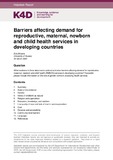| dc.contributor.author | Browne, Evie | |
| dc.date.accessioned | 2020-04-24T08:27:37Z | |
| dc.date.available | 2020-04-24T08:27:37Z | |
| dc.date.issued | 2020-03-30 | |
| dc.identifier.citation | Browne, E., (2020). Barriers affecting demand for RMNCH services in developing countries. K4D Helpdesk Report. Brighton, UK: Institute of Development Studies. | en |
| dc.identifier.uri | https://opendocs.ids.ac.uk/opendocs/handle/20.500.12413/15250 | |
| dc.description.abstract | Many studies conclude that a similar combination of barriers across various contexts work together to create low care-seeking behaviour and demand for reproductive, maternal, newborn and child health (RMNCH) services: cost; cultural, gender, and traditional norms; lack of knowledge and education; quality of service; and geographical inaccessibility. The same barriers are frequently identified across a broad range of literature and different countries, and the evidence is consistent and strong. There is a large amount of literature from South Asia, and a considerable amount from Sub-Saharan Africa. Most studies highlight that barriers are best addressed by considering them holistically and in the way that different factors intersect to combined effect. Prioritising one barrier over another may not achieve positive results. Community-level approaches including decision-makers and men are also recommended, to overcome intersecting barriers. Additionally, supply- and demand-side barriers often work in tandem, and where possible, multiple levels of the health system as a whole should be taken into account. This review examines evidence on socio-cultural and other barriers affecting demand for reproductive, maternal, newborn and child health (RMNCH) services in developing countries. This review focuses on nine different aspects as the barriers: gender, views of childbirth as natural, religion and superstition, education, knowledge and tradition, low quality care and lack of trust in service providers, cost, distance and accessibility, community-level barriers, and language. | en |
| dc.language.iso | en | en |
| dc.publisher | IDS | en |
| dc.relation.ispartofseries | K4D Helpdesk Report;795 | |
| dc.rights.uri | https://www.nationalarchives.gov.uk/doc/open-government-licence/version/3/ | en |
| dc.subject | Children and Youth | en |
| dc.subject | Development Policy | en |
| dc.subject | Gender | en |
| dc.subject | Health | en |
| dc.subject | Rights | en |
| dc.title | Barriers Affecting Demand for Reproductive, Maternal, Newborn and Child Health Services in Developing Countries | en |
| dc.type | Helpdesk | en |
| dc.rights.holder | © DFID - Crown copyright 2020 | en |
| dcterms.dateAccepted | 2020-03-30 | |
| rioxxterms.funder | Department for International Development, UK Government | en |
| rioxxterms.identifier.project | K4D | en |
| rioxxterms.version | VoR | en |
| rioxxterms.funder.project | 238a9fa4-fe4a-4380-996b-995f33607ba0 | en |

